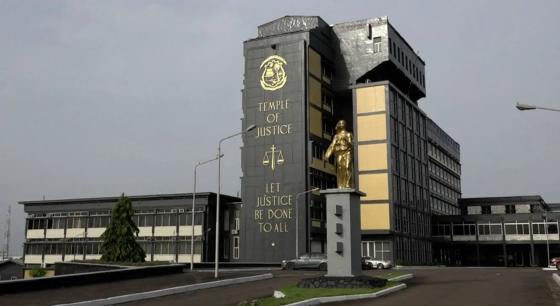Liberia: LACC Case Goes to Supreme Court Full Bench

... Meanwhile, Kaba’s decision to allow his colleagues and himself ample opportunity to study the merits before a final ruling can be made, is in line with the 1986 Constitution of the Republic of Liberia, where a single chamber justice cannot issue any decisions on constitutional provisions.
Supreme Court Chamber Justice Yussif D. Kaba has forwarded the Liberia Anti-Corruption Commission (LACC) case to the full bench without ruling on the merits of the case.
The lack of a ruling means Associate Justice Kaba believes the arguments propounded by the parties, Cllr. Edwin Kla Martin, Executive Chairman of the LACC, and the government need to get a hearing from the full bench because it raises constitutional issues that can only be heard and determined by the Full Bench.
It is not clear whether the Writ of Prohibition, as prayed for by Martin, requesting the Supreme Court of Liberia to forbid the Weah government from enforcing the LACC Restated Act, still stands.
According to Martin, the Restated Act amounts to a breach of contract since the government was in error in dissolving his tenured position and then creating the same.
Meanwhile, Kaba’s decision to allow his colleagues and himself ample opportunity to study the merits before a final ruling can be made, is in line with the 1986 Constitution of the Republic of Liberia, where a single chamber justice cannot issue any decisions on constitutional provisions.
Article 66 of the Constitution states: “The Supreme Court shall be the final arbiter of constitutional issues and shall exercise final appellate jurisdiction in all cases, whether emanating from courts of record, courts not of record, administrative agencies, autonomous agencies, or any other authority, both as to law and fact, except cases involving ambassadors, ministers, or cases in which a country is a party. The Supreme Court shall have original jurisdiction in all such cases. The Legislature shall make no law nor create any exceptions which would deprive the Supreme Court of any of the powers granted herein. "
The suit against Martin comes as the President has already signed into law the Restated LACC Act, which, among other things, dissolved the workforce of the anti-corruption watchdog, including Martin’s tenured position.
Martin’s suit, which is a writ of prohibition, requests the Supreme Court of Liberia to forbid the Weah government from enforcing the LACC restated act. He says it amounts to a breach of contract as the government was in error in dissolving his tenured position and then creating the same.
He argued that Part XVI of the restated act is discriminatory and totally against the country’s 1986 Constitution and should not be allowed to stand, since it would undermine the strides made by LACC and other integrity institutions to expose corrupt officials.
The section, as quoted by Martin, mandates the Weah government to ensure that the current LACC senior management team remains in office until their successors are appointed.
Part XVI of the law, which focuses on transitional provisions, is quoted as saying, "All the commissioners now serving the LACC shall remain in office after the enactment of this new law, until their successors are appointed, but each is eligible to apply and be subjected to the appointment procedure provided for under this law."
His suit against the government is the latest in a long-running debate around the restated LACC act, which he claims will be used to suppress the fight against corruption in Liberia.
Critics of the legislation claim that it represents a broader attack on the fight against corruption in a country that is already corrupt and would undermine the gains made by the current LACC leadership in exposing corruption in the executive.
The restatement, according to Martin, is a dangerous escalation made to silence him for coming down hard on public officials involved in corruption.
And Martin’s lawyer, Cllr. Johnny Momoh, while petitioning the Court, also claimed that paragraphs 16.1 and 16.2 of the restated LACC Act, are not in conformity with the principles and doctrine of expo facto law as enshrined in Article 21 of the constitution.
“The restated LACC act contains provisions that are not applicable and, if allowed to hold, would be a gross violation of the principle and doctrine of the expo facto law as enshrined in Article 21 of the 1986 Constitution,” Cllr. Momoh said, praying the Court to grant the alternative writ of prohibition as provided by Chapter 16, Section 16.21 of the Civil Procedure Law of Liberia.
“The law states that no person shall be made subject to any law or punishment which was not in the effect at the time of commission of an offense, nor shall the Legislature enact any bill of attainder or ex post facto law,” Momoh said. “The new act seeking the immediate removal of the LACC chairman and other commissioners is illegal and, therefore, the Justice In Chamber is asked to grant this petition to undo the decision.”
The legislature’s decision to wholly restate the LACC act of 2008 came after Weah had requested in 2021 that the legislature adopt a ‘minor adjustment’ to the act to give the commission direct power to prosecute.
The lawmakers, however, chose restatement over the amendment, passing a law that critics say unjustifiably limits the Commission’s capacity to connect with the public and provide updates on the progress of investigations, which is more than required for openness, accountability, and other relevant reasons that best serve the public interest.
